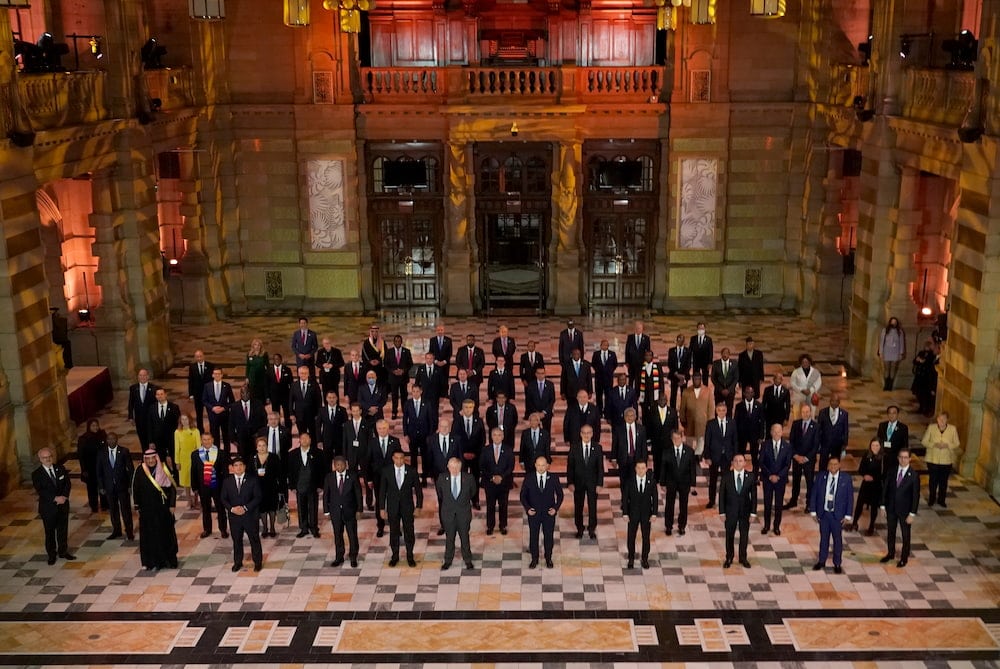World leaders have turned up the heat and resorted to end-of-the-world rhetoric in an attempt to bring new urgency to sputtering international climate negotiations.
The metaphors were dramatic and mixed at the start of the UN climate talks, known as COP26. UK Prime Minister Boris Johnson described global warming as “a doomsday device” strapped to humanity. United Nations Secretary-General Antonio Guterres told his colleagues that humans were “digging our own graves”.
And Barbados Prime Minister Mia Mottley, speaking for vulnerable island nations, warning leaders not to “allow the path of greed and selfishness to sow the seeds of our common destruction”.
Amid the speeches on Monday, Indian Prime Minister Narendra Modi said his coal-dependent country would aim to stop adding greenhouse gases to the atmosphere by 2070 – two decades after the United States and at least 10 years later than China.
Modi said the goal of reaching net zero by 2070 was one of five measures India planned to undertake to meet its commitments under the Paris climate accord.
Meanwhile, US President Joe Biden and German Chancellor Angela Merkel avoided soaring rhetoric and delved into policy.
“There’s no more time to sit back,” Biden said in a more measured warning that also apologised for his predecessor’s decision to temporarily pull the US out of the historic 2015 Paris agreement, something he said put the country behind in its efforts. “Every day we delay, the cost of inaction increases.”
In a recorded welcome message, Queen Elizabeth II said she hoped the conference would be “one of those rare occasions where everyone will have the chance to rise above the politics of the moment”.
“History has shown that when nations come together in common cause, there is always room for hope,” she said.
One of the UN’s biggest concerns is that some countries are more focused on amorphous long-term net-zero goals instead of seeking cuts this decade that could prevent temperature increases that would exceed the Paris goal.
Modi also outlined shorter-term goals for the world’s third-biggest carbon emitter: raising its goal for non-fossil energy production, meeting half of its energy needs with renewable sources, cutting carbon emissions by one billion tonnes compared with previous targets and reducing the carbon intensity of its economy by 45 per cent – all by 2030.
European Commission President Ursula von der Leyen touted already announced efforts to make Europe “the first net-zero continent” in the long-term and cut emissions 55 per cent in this decade. She pushed for other rich countries to aid poorer nations as much as Europe does and put a price on carbon emissions because “nature cannot pay that price any more”.
Bolivia President Luis Arce said the speeches from developed countries sought to portray them as climate change leaders “but this is far from the truth”. He said rich nations needed to face their historic responsibilities for causing the warming problem and not fix it by forcing rules on poor countries.
Outside the negotiations, youth climate activist Greta Thunberg accused world leaders of “pretending to take our future seriously”.
“Change is not going to come from inside there,” Thunberg said, “We say no more blah-blah-blah.”
The conference aims to get governments to commit to curbing carbon emissions fast enough to keep global warming to 1.5C above pre-industrial levels. The world has already warmed 1.1C. Current projections based on planned emissions cuts during the next decade are for it to hit 2.7C by 2100.
Increased warming in coming decades would melt much of the planet’s ice, raise global sea levels and greatly increase the likelihood and intensity of extreme weather, scientists say.
The other goals for the meeting are for rich nations to give poor nations $US100 billion ($A133 billion) a year in climate aid and to reach an agreement to spend half of the money to adapt to worsening climate impacts.
A handful of major absences were noticeable on Monday.
Xi Jinping, president of top carbon-polluting nation China, is not in Glasgow. Figueres said his absence was not that significant because he was not leaving the country during the pandemic and his climate envoy was a veteran negotiator.
Biden has chided China and Russia for their less-than-ambitious efforts to curb emissions and blamed them for a disappointing statement on climate change at the G20 meeting in Rome this weekend.
The heads of several major emerging economies are also skipping Scotland, including those from Russia, Turkey, Mexico, Brazil and South Africa.
AAP
Get all the latest Canberra news, sport, entertainment, lifestyle, competitions and more delivered straight to your inbox with the Canberra Daily Daily Newsletter. Sign up here.



